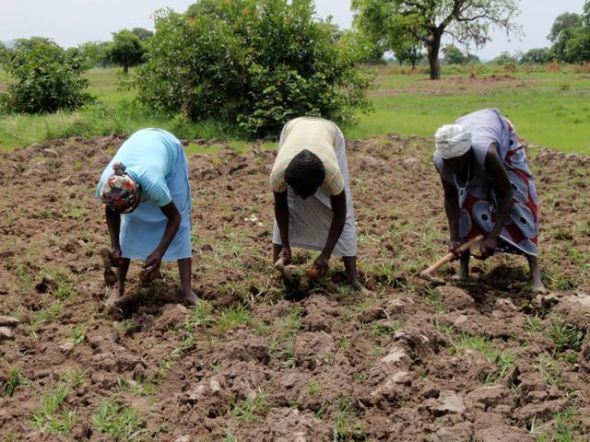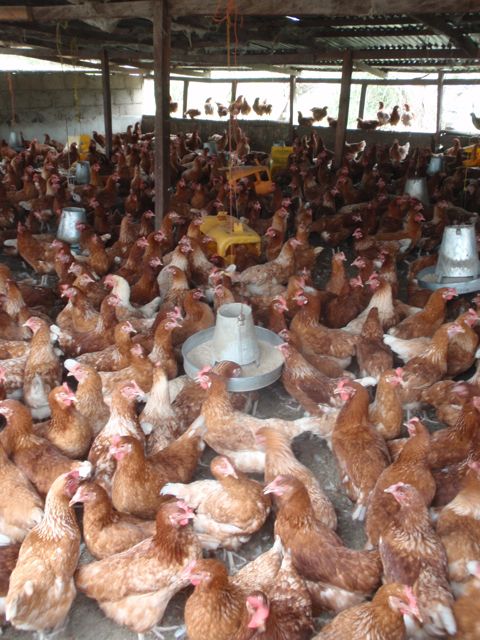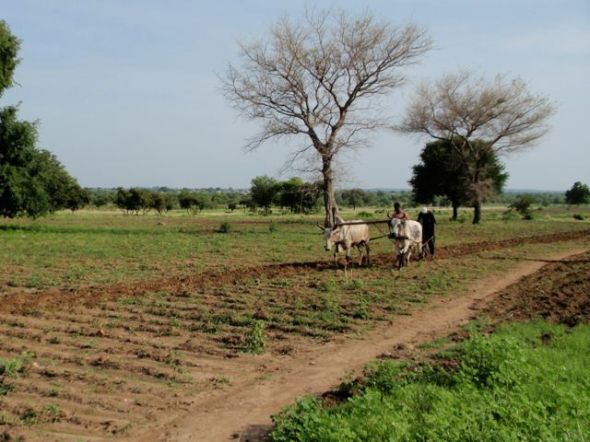Sustainable Food Security: Agricultural Models for the 21st Century
This is a post for Blog Action Day (#bad11), a movement that aims to start a global discussion through thousands of blogs posted in one day on the same topic. This year, the topic is one dear to my heart: Food. I have been thinking about food a lot for the past 1.5 years through my work in agriculture with EWB. We are working closely with the Ghanaian Ministry of Food and Agriculture to reach out to farmers, but what are we working toward? This question has nagged me more and more as time goes on, to the point that I ran a learning session at our last EWB retreat with the same name as the title of this post – Sustainable Food Security: Agricultural Models for the 21st Century.I’ve been reading a lot on this topic in the past 8 months. I’m not sure if there’s a trend toward addressing this issue lately, or if I’m just noticing the articles because I’m finally looking for them, but there is a LOT of writing out there! I’ve summarized a few of my favourite articles in the “Further Reading” section at the end of this post.
I have been thinking about food a lot for the past 1.5 years through my work in agriculture with EWB. We are working closely with the Ghanaian Ministry of Food and Agriculture to reach out to farmers, but what are we working toward? This question has nagged me more and more as time goes on, to the point that I ran a learning session at our last EWB retreat with the same name as the title of this post – Sustainable Food Security: Agricultural Models for the 21st Century.I’ve been reading a lot on this topic in the past 8 months. I’m not sure if there’s a trend toward addressing this issue lately, or if I’m just noticing the articles because I’m finally looking for them, but there is a LOT of writing out there! I’ve summarized a few of my favourite articles in the “Further Reading” section at the end of this post.
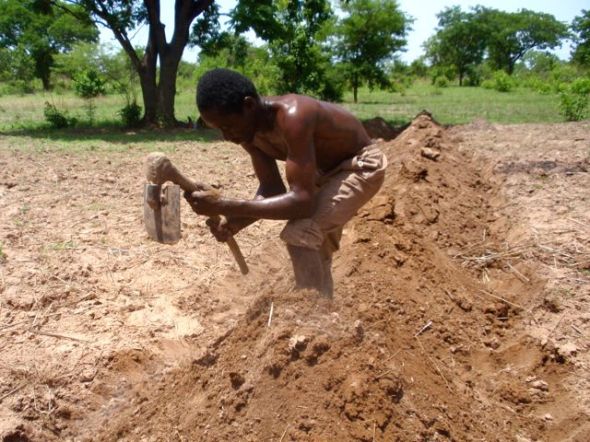 The Issues
The Issues
First, let’s get to the heart of the issue: it’s a matter of food production vs. environmental sustainability. Traditional industrial agriculture has achieved record production through intensive farming practices, mechanized farming and petro-chemical inputs applied with machine-like precision. This has come at the expense of the environment, with corporate farms using up precious fossil fuels and destroying ecosystems in the quest for more food. However, viewing these as two opposing goals is a false dichotomy; if we want to achieve food security far into the future, we must find a way to fulfill both of these goals AT THE SAME TIME! My research into this topic has tried to answer this question: what model of agriculture will allow us to achieve sustainable global food security?
Development workers have a unique perspective on the problem of global food security because we must take into account an additional question, “what is good for poor farmers?” In this case, it’s not just about achieving adequate food production, or nutrition levels, or even environmental sustainability. We must also take into account the lifestyle of the poor Ghanaian farmer, who is being asked to adopt this model to continue providing food for his fellow citizens. What model of agriculture will spur human development in Ghana while also fulfilling the above two goals?
Though I mentioned that there are a lot of people writing on this topic right now, there is a relatively low level of consensus as to what the future model of global agriculture should be. There is a never-ending number of models being promoted (organic, agroecology, industrial, urban, etc.), each with its own convincing arguments and promoters. This is quite startling, and makes it very difficult to choose one agricultural model to promote in our work. So how can we plan for the future?
Let’s be very clear here: the following are my personal opinions, not those of EWB, Ghanaian farmers, or anyone else you might confuse me with. There is no right answer, only a series of thoughts and questions that remain to be determined.
Traditional agriculture in Ghana is somewhat organic, in the sense that there are no chemicals applied to the crops. Most farmers practicing these traditional methods also don’t use improved seeds, proper land preparation techniques or any other Good Agricultural Practices (GAPs). As a result, they get low yields compared to their neighbours who use “modern” techniques – mechanized land preparation, chemical fertilizers/herbicides/pesticides, and better GAPs. This is leading Ghanaian farmers to see chemical agriculture as the way forward, when in fact many of these GAPs applied to their traditional organic fields would also increase yields significantly.
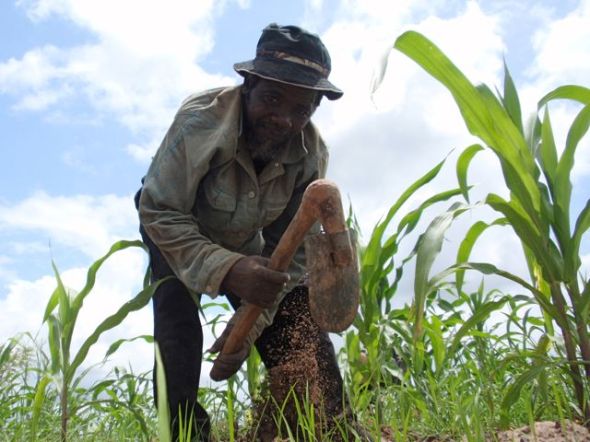 Right now, MoFA is steering Ghana toward a future of intensive industrial agriculture through credit-in-kind schemes and input subsidies. And why shouldn’t they? This is the path every other industrialized nation has taken to get out of poverty and push forward their economies. But I think it’s too late to take this path. The time has come when oil-based agriculture is getting too expensive (and oil prices are too volatile) to rely on. The price of oil will only increase in the next 20 years, so why are we promoting a model of dependence on these inputs in Ghana?
Right now, MoFA is steering Ghana toward a future of intensive industrial agriculture through credit-in-kind schemes and input subsidies. And why shouldn’t they? This is the path every other industrialized nation has taken to get out of poverty and push forward their economies. But I think it’s too late to take this path. The time has come when oil-based agriculture is getting too expensive (and oil prices are too volatile) to rely on. The price of oil will only increase in the next 20 years, so why are we promoting a model of dependence on these inputs in Ghana?
If things go ahead as MoFA wants them to, soon the majority of Ghanaian farmers will be using industrial agriculture methods. Food security in the country will be improved, but for how long? Soon fuel prices will be too high for Ghanaians to afford the food produced in this manner, and we will be thrown back into food insecurity. Ghana is at the brink of “maturity” in agriculture, about to choose a method to promote and follow for decades to come. Let’s help them make an appropriate and sustainable choice.
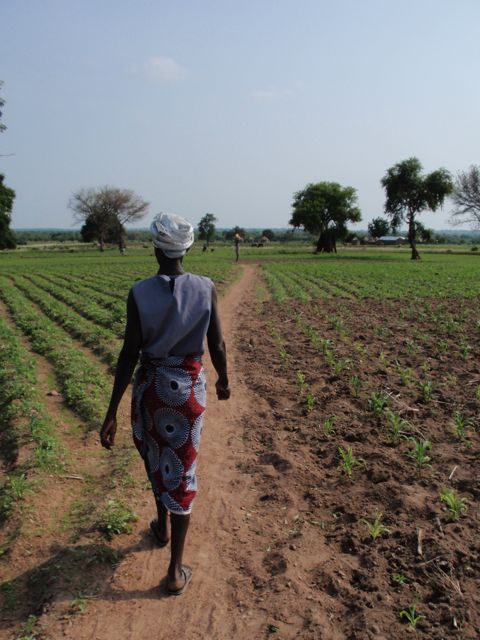 My colleague Mina works with an organic fertilizer company near Tamale and often cites a study that showed yields to be virtually the same when appropriate amounts of chemical and organic fertilizer were applied to test fields. In fact, the plot with the highest yields used a combination of both types of fertilizer. So why are these methods most often presented as mutually exclusive?
My colleague Mina works with an organic fertilizer company near Tamale and often cites a study that showed yields to be virtually the same when appropriate amounts of chemical and organic fertilizer were applied to test fields. In fact, the plot with the highest yields used a combination of both types of fertilizer. So why are these methods most often presented as mutually exclusive?
There are many sustainable practices being used in Ghana on a small scale – sustainable land management, soil fertility techniques, inter-cropping to naturally get rid of pests, organic fertilizers and weedicides and many other GAPs. What are the best ways for EWB to promote these techniques without being paternalistic and dictating the way forward for Ghana’s agricultural development? Tricky…
I think one of the key lessons here is that we need to be adaptive, changing our approach depending on the conditions (economic, social and environmental) in which we find ourselves. Of course, these conditions are changing all the time, so we need to be constantly testing our assumptions, checking if the information we gathered 1 year, 6 months or even 2 weeks ago is still relevant today. And we need to help the Government of Ghana to have the same resilient approach, adapting to new information and conditions as the world lumbers toward a new model for sustainable food security.
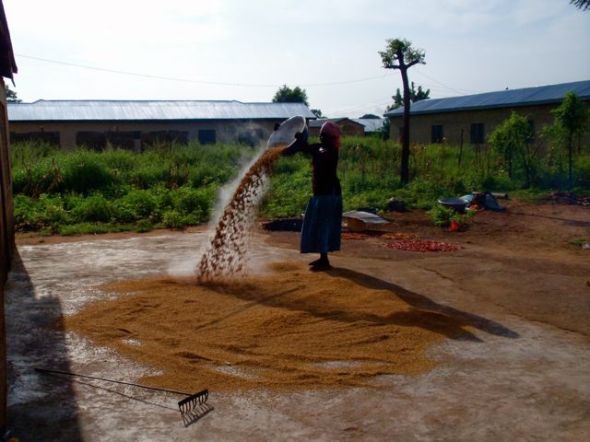 More Details
More Details
Different levels of thinking about this:
- Global food systems
- Consumers in Canada
- African agriculture
- Farmers
- EWB’s stance
- Our strategies
More questions to ponder…
- How do we bridge economic development & environmental sustainability in Africa?
- What are the pros and cons of each agricultural model?
- How do these changes in policy translate to realities on the ground?
- What stance should EWB and other NGOs take on these issues? How will this effect our work?
 Other tricky issues (you can Google these for more info):
Other tricky issues (you can Google these for more info):
- African land grabs
- GM crops
- Foreign investment
- Subsidies
- Food price volatility
- Climate change
- Famine
- Biodiversity
- Farmers’ rights
- Biofuels
Special report on the future of food – population, development, environment, politics, nutrition, food waste:
- ‘A Prospect of Plenty’. The Economist, Feb. 24, 2011. http://www.economist.com/node/18200642
Politics, global markets, demand for food:
- ‘The new geopolitics of food’. Foreign Policy, May/June, 2011. http://www.foreignpolicy.com/articles/2011/04/25/the_new_geopolitics_of_food?page=full
Olivier De Schutter, UN Special Rapporteur on the right to food, and the concept of agroecology:
- ‘Save climate and double food production with eco-farming’. IPS, Mar. 8, 2011. http://www.ips.org/africa/2011/03/save-climate-and-double-food-production-with-eco-farming/
- ‘Sustainable farming can feed the world?’. New York Times, Mar. 8, 2011. http://opinionator.blogs.nytimes.com/2011/03/08/sustainable-farming/
Agroecology and development:
- ‘Can the world feed 10 billion people?’. Foreign Policy, May 4, 2011. http://www.foreignpolicy.com/articles/2011/05/04/can_the_world_feed_10_billion_people?page=full
Organic farming:
- ‘Study debunks myths on organic farms’. Star Phoenix, Sept. 27, 2011. http://www.thestarphoenix.com/business/story.html?id=5462520
- ‘Organic agriculture: deeply rooted in science and ecology’. Grist.org, Apr. 21, 2011. http://www.grist.org/sustainable-farming/2011-04-20-eliot-coleman-essay-organic
- ‘On agricultural productivity and food security’. Ed Carr, Open the Echo Chamber. Sept. 26, 2011. http://www.edwardrcarr.com/opentheechochamber/2011/09/26/on-agricultural-production-and-food-security/
Concentrated industrial vs. wide-spread “nature-friendly” agriculture, which is better for the environment:
- ‘Farming: Thoughts on an intense debate’. BBC, Sept. 2, 2011. http://www.bbc.co.uk/news/science-environment-14761015
Smallholder farmers and environmental sustainability:
- ‘Global food crisis: Smallholder agriculture can be good for the poor and the planet’. Guardian, June 1, 2011. http://www.guardian.co.uk/global-development/poverty-matters/2011/jun/01/smallholder-agriculture-farming-good-poor-planet
Findings of DuPont Advisory Committee on Agricultural Innovation and Productivity for the 21st Century:
- ‘Food security has global implications’. Politico.com, June 7, 2011. http://www.politico.com/news/stories/0611/56342.html
Moving from old to new models of agriculture:
- ‘A warming planet struggles to feed itself’. New York Times, June 4, 2011. http://www.nytimes.com/2011/06/05/science/earth/05harvest.html?_r=2&pagewanted=all
- ‘The farms are not all right’. Walrus, October, 2011. http://www.walrusmagazine.com/articles/2011.10-food-the-farms-are-not-all-right/

